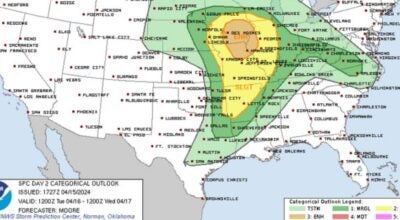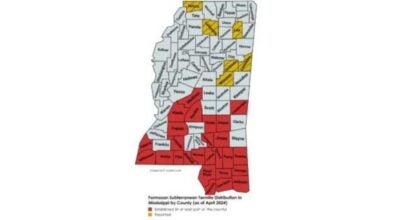Mississippi: 2% of COVID vaccines go to out-of-state people
Published 6:12 am Tuesday, February 9, 2021
About 2% of the COVID-19 vaccinations given so far in Mississippi have gone to people with out-of-state addresses, state health officials said Monday.
Mississippi guidelines say the vaccination is available to anyone 65 or older or to those who are least 16 years old and have underlying health conditions that might make them more vulnerable to the virus.
The state’s top public health officials said Monday that the vaccination is supposed to be limited to Mississippi residents, or to people from other states who work in Mississippi. However, they said people giving the shots do not check identification or verify that out-of-state residents work in Mississippi.
“We don’t want to create barriers,” the state health officer, Dr. Thomas Dobbs, said in response to questions during an online news conference. “To get a vaccine in Mississippi, you’re supposed to be a resident or work here. If you get a vaccine here and you don’t do either, when you fill out the application, you’re being dishonest. Right? So, there is a step in the process where we have to depend upon people’s ethical behavior. It’s obviously unethical to be misleading and lie on your enrollment.
“But we don’t want to have someone who’s older and doesn’t have a driver’s license having an impediment to getting a vaccine because they don’t have a driver’s license, or they don’t have ID,” Dobbs said.
As of Monday, 334,000 people had received either a first dose or both doses of the COVID-19 vaccination in Mississippi. That included 6,777 people with out-of-state addresses, said Dr. Paul Byers, the state epidemiologist.
The New Orleans Advocate/The Times-Picayune recently reported that Louisiana residents are traveling to Mississippi to be vaccinated, and that some are turning to online discussion groups to get information about where to go. Louisiana has tighter vaccination eligibility guidelines. On Monday, it lowered the age of eligibility from 70 to 65, but it still lists fewer underlying health conditions than Mississippi in making people eligible.
Both Louisiana and Mississippi also make the vaccines available to health care workers and to people who live in nursing homes or other long-term care facilities.
Mississippi has 21 drive-thru vaccination sites, with 19 of those operated by the state and two by county governments. Starting Feb. 23, another drive-thru site will open in Bolivar County, in the parking lot of the Delta State University football stadium. Vaccinations are also available at some health care clinics, including community health centers.
The Health Department said Monday that 31 Walmart stores in Mississippi will start receiving doses of COVID-19 vaccines Tuesday. Vaccination appointments must be made through the company’s website, and an email address is required.
Dobbs also said the state Health Department is taking steps to address the disparity in vaccination numbers for Black residents. About 38% of Mississippi residents are Black, but about 19% of COVID-19 vaccinations in the state so far have been given to Black people. That is an increase in the percentage over recent weeks, but Dobbs said more progress is needed.
“It’s a challenge for Mississippi, and it’s a challenge for our nation,” Dobbs said.
He said the issue of access to vaccinations in Black communities “is huge.”
“We have identified select partners that are more efficient at reaching Black populations, and we also are looking at other innovative approaches that you’ll see in coming days,” Dobbs said.
He said some “community partners” are doing vaccinations through mobile clinics, including some at Black churches.
The state Health Department reported Monday that Mississippi had 635 new confirmed cases of the virus as of Sunday evening. The department also reported one new death. The state has reported at least 282,313 cases of the virus and 6,270 related deaths since the start of the pandemic.






